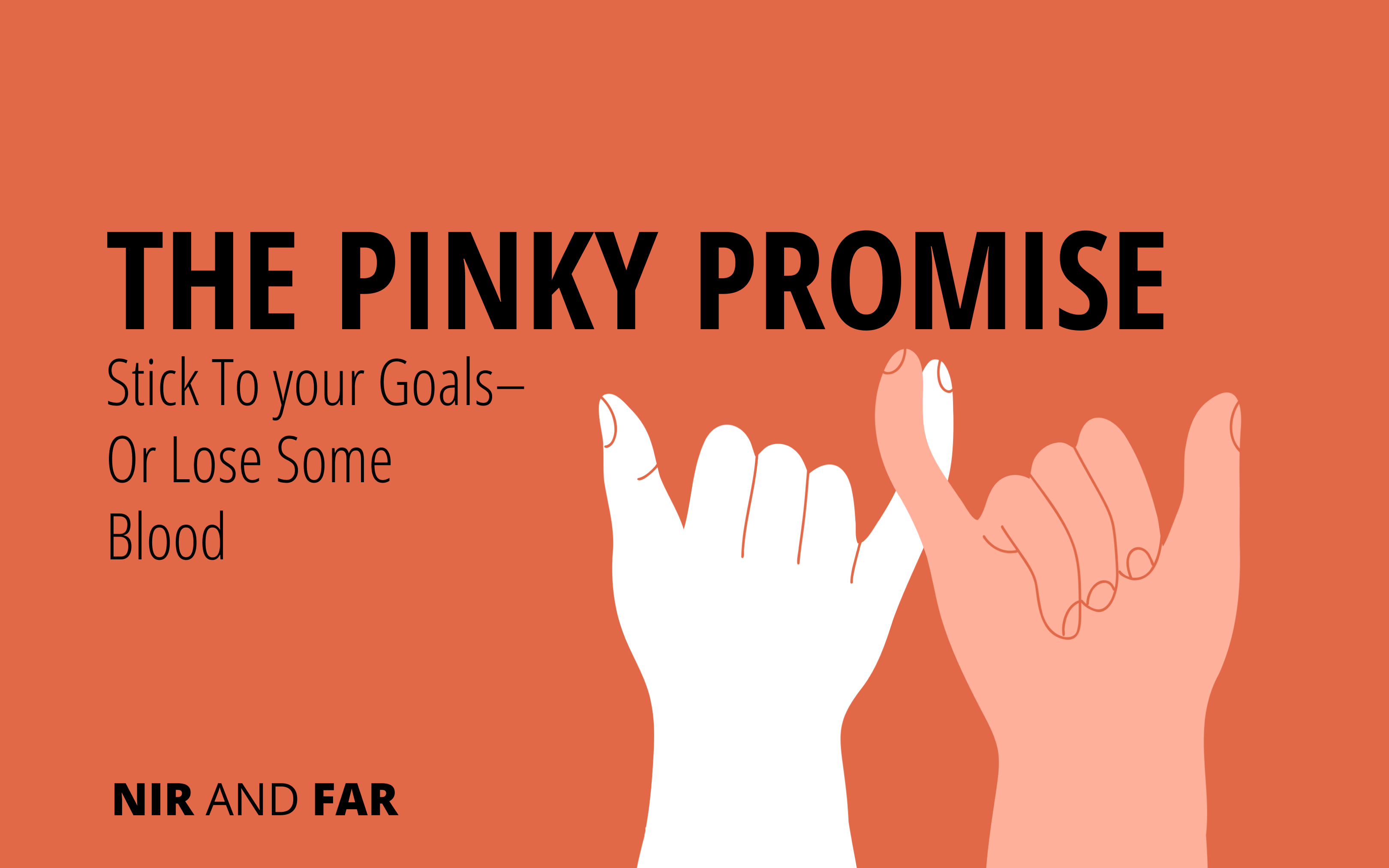People have a long history of breaking promises, to themselves and to others. It’s not lying, per se—rather, it’s a lack of follow-through.
We say we’re going to exercise four times a week, or finish that big project, or finally write that blog post, or whatever. But when it comes down to it, we don’t do it. We get distracted and procrastinate.
Our excuse? “I can’t.”
But the truth is, of course, you can! You just need the right motivation.
For as long as people have been squelching on their commitments, they’ve tried to come up with ways to keep them.
Consider the pinky promise.
This seemingly innocuous children’s pact has a dark past: It’s said to have been used by the Japanese mafia, who would cut off the pinky finger of the person who broke their word.
What are the odds that someone breaks that sort of pinky pact? I’m betting pretty low.
Imagine if you made such a strong commitment in your own life.
What if you told yourself that if you didn’t wake up early and go to the gym, it would cost you a finger? Would you go? Of course you would!
We’ve now established that “I can’t” isn’t a real excuse. If the stakes were high enough, you’d do what you need to do.
So what’s getting in our way?
Why We Don’t Do What We Say We’re Going to Do
The root cause of all human behavior is the desire to escape discomfort.
In fact, it’s the number one reason people don’t stick to their goals—because they avoid what’s not enjoyable. They just don’t “feel like it.”
When faced with something we don’t want to do, we are driven to distraction by internal triggers. These are negative feelings, such as uncertainty, fear, loneliness, or boredom.
To do the things we say we’re going to do, we have to learn to manage those internal triggers. That means finding the root cause of the bad feeling.
The next time you find yourself repeatedly distracted during an activity, ask yourself why that is. What is the source of the feeling you’re trying to escape? If you know the real drivers of your behavior, you can take steps to master them instead of letting them master you.
Next, to really step away from distraction, we have to make time for traction—the actions that move us toward what we intend to do.
That means pinpointing your values and setting aside time for the actions that help you become the person you want to become.
The most effective technique for staying on track is timeboxing—planning out periods of time to do what you say you will each day. I even created a free schedule maker that will help you devise your own timeboxed weekly calendar.
Once we know exactly how we want to spend our time, we can focus on fending off the external triggers that pull us to distractions.
External triggers are cues from our environment that tell us what to do next. These can run the gamut from notifications on your smartphone to interruptions from nearby family members or coworkers.
The best way to deal with external triggers that interfere with your timeboxed calendar is to eliminate them. Turn off those pesky notifications on your phone that don’t serve you. If you want time to work uninterrupted, let your colleague or family know to steer clear of you during the time you’ve allotted for it.
Swear a Pinky Promise With Yourself
Once we learn to manage our internal triggers, make time for traction, and hack back external triggers, we can prevent distraction and stop ourselves from ditching our goals by making a pact—a pinky promise.
In making this pinky pact, we erect a barrier, a consequence to not doing what we say we’re going to.
When I wanted to finish the first draft of my book Indistractable, I swore a pinky promise to my accountability partner that I would pay him $10,000 if I didn’t finish the draft by my deadline. I kept my money and finished writing my book.
It’s important to only enter into such a pact after you’ve done the other three steps first. If you don’t learn how to manage the bad feelings driving you off course before you make your pact, you’ll be more likely to fail.
Be honest with yourself about what consequences would ensure you don’t break a commitment. And if making a promise to yourself isn’t enough, then consider finding yourself an accountability buddy to make sure you follow through. Just be sure your buddy knows not to take an actual pinky finger.
Related Articles
- Schedule Maker: a Google Sheet to Plan Your Week
- Habit Tracker Template in Google Sheets
- The Ultimate Core Values List: Your Guide to Personal Growth
- Timeboxing: Why It Works and How to Get Started in 2024
- An Illustrated Guide to the 4 Types of Liars
- Hyperbolic Discounting: Why You Make Terrible Life Choices
- Happiness Hack: This One Ritual Made Me Much Happier

